Job 42 meaning explained in AI Summary
In Job chapter 42, we witness Job's complete restoration and the conclusion of his ordeal.
Here's a breakdown:
- Job's Humble Response (42:1-6): After hearing God speak from the whirlwind, Job finally understands the vastness of God's power and the limitations of his own understanding. He repents of questioning God and admits his unworthiness. This isn't a defeated repentance, but one born from awe and newfound understanding.
- God Rebukes Job's Friends (42:7-9): God condemns Eliphaz and his friends for their inaccurate and unhelpful pronouncements about Job's suffering. They assumed Job's suffering was punishment, failing to grasp the complexity of God's plan. God instructs them to offer a sacrifice and seek Job's intercession for their forgiveness.
- Job's Intercession and Restoration (42:10-17): Job demonstrates his renewed faith and obedience by praying for his friends. God then blesses Job abundantly, restoring his health, wealth, and family. He receives twice as much as he had before his suffering, symbolizing God's overwhelming grace and favor.
- A Life of Blessing (42:10-17): Job lives a long and fulfilling life, surrounded by his family and blessed with prosperity. This ending emphasizes that God doesn't always prevent suffering, but He remains faithful and can bring restoration and blessing even from the ashes of hardship.
Key Themes:
- God's Sovereignty: God's power and wisdom are beyond human comprehension. We may not always understand His ways, but we can trust in His ultimate goodness.
- The Limits of Human Wisdom: Job's friends, though well-intentioned, demonstrate the danger of applying simplistic explanations to complex situations.
- The Importance of Humility: Job's willingness to acknowledge God's greatness and his own limitations is key to his restoration.
- The Hope of Restoration: Even in the face of unimaginable suffering, God offers the possibility of healing, redemption, and renewed blessing.
Job 42 offers a powerful conclusion to the book, reminding us that even when we face trials we cannot understand, God remains in control, and He is capable of bringing beauty from ashes.
Job 42 bible study ai commentary
Job 42 reveals the climax of Job’s spiritual journey and the final resolution of his trial. It moves from Job's humble repentance, born from a direct encounter with God, to God's stunning vindication of Job and rebuke of his friends. The chapter concludes with Job’s intercession and his complete restoration, demonstrating God’s ultimate justice, mercy, and sovereign goodness, showing that suffering can lead to a deeper, more authentic knowledge of God.
Job 42 context
The book of Job is set in the patriarchal period, likely contemporary with or slightly before Abraham. It operates outside the framework of the Mosaic Law. The central cultural and theological belief it confronts is Retribution Theology: the idea that God operates a strict, immediate system of justice on earth where the righteous always prosper and the wicked always suffer. Job’s friends are the champions of this view. The final chapter demolishes this rigid system by having God Himself declare it false, validating Job’s honest, wrestling faith over their sterile, orthodox, but incorrect pronouncements.
Job 42:1-2
Then Job answered the Lord and said: "I know that you can do all things, and that no purpose of yours can be thwarted."
In-depth-analysis
- This is Job’s direct answer to God’s speeches in chapters 38-41. It is not coerced but is a genuine confession.
- "I know" (Hebrew:
yādaʿtî): This is not mere intellectual assent. It signifies a deep, personal, and experiential knowledge gained through his encounter. His knowledge has moved from theoretical to relational. - "You can do all things": An unreserved acknowledgment of God’s omnipotence, a truth he intellectually knew before but now accepts in its fullness without his previous bitter qualifications.
- "No purpose of yours can be thwarted" (Hebrew:
mĕzimmâfor 'purpose'): He now understands that God’s plan is not arbitrary but purposeful and unstoppable, even when it is inscrutable to humans. He yields his right to understand everything.
Bible references
- Isaiah 46:10: "...My counsel shall stand, and I will accomplish all my purpose..." (God's unstoppable plan)
- Daniel 4:35: "...he does according to his will... and none can stay his hand..." (Divine sovereignty)
- Ephesians 1:11: "...who works all things according to the counsel of his will." (God's ultimate purpose in Christ)
Cross references
Gen 18:14 (God's omnipotence); Ps 115:3 (God's sovereign will); Prov 19:21 (Man proposes, God disposes); Rom 8:28 (All things work for good); Isa 14:27 (God's purpose cannot be annulled).
Job 42:3
"Who is this that hides counsel without knowledge?’ Therefore I have uttered what I did not understand, things too wonderful for me, which I did not know."
In-depth-analysis
- Job quotes God's challenging question from Job 38:2 back at Him. This is an act of humble agreement, admitting, "That was me. I am the one who spoke in ignorance."
- He confesses that his eloquent speeches and legal complaints were spoken from a position of profound limitation.
- "Things too wonderful" (Hebrew:
niplā'ôt): This word is often used for God’s miracles and wondrous deeds (Ex 3:20, Ps 78:4). Job now sees God’s governance of the world, even the painful parts, as being in this category of divine wonder—beyond human critique.
Bible references
- Psalm 139:6: "Such knowledge is too wonderful for me; it is high, I cannot attain it." (Human limitation before God's omniscience)
- Isaiah 55:9: "For as the heavens are higher than the earth, so are my ways higher than your ways and my thoughts than your thoughts." (Inscrutability of God's mind)
- 1 Corinthians 13:12: "For now we see in a mirror dimly, but then face to face. Now I know in part..." (Partial human knowledge)
Cross references
Ps 40:5 (God's wonderful deeds); Ps 131:1 (Not concerned with things too great); Rom 11:33 (Depth of God's wisdom).
Job 42:4
"Hear, and I will speak; I will question you, and you make it known to me.’
In-depth-analysis
- Job again quotes God's words (from Job 38:3, 40:7), but re-frames them. What God issued as a challenge ("Gird up your loins... I will question you"), Job now echoes as a humble plea.
- The desire for a confrontation has been transformed into a desire for instruction. He is now ready to listen on God's terms, as a student before a master.
Bible references
- Psalm 25:4: "Make me to know your ways, O Lord; teach me your paths." (A humble plea for divine instruction)
- James 1:5: "If any of you lacks wisdom, let him ask God, who gives generously to all without reproach..." (Asking God for understanding)
Cross references
Ps 119:12 (Teach me your statutes); Prov 2:6 (Lord gives wisdom).
Job 42:5-6
"I had heard of you by the hearing of the ear, but now my eye sees you; therefore I despise myself, and repent in dust and ashes."
In-depth-analysis
- This is the theological heart of the book and Job’s personal transformation.
- "Hearing of the ear": Represents his former knowledge—secondhand, traditional, orthodox, but impersonal.
- "Now my eye sees you": Signifies a direct, personal, and overwhelming experiential encounter with the living God. This is revelation, not just information.
- "I despise myself" (Hebrew:
em'as): This is a difficult phrase. While it can mean "despise," many scholars argue it contextually means "I retract" or "I recant" my arguments and legal case against God. He is retracting his words, not loathing his existence. - "Repent" (Hebrew:
nāḥamtî): This verb can mean "repent," "relent," or "be comforted." Given the context, Job is repenting of his attitude of defiant questioning and finding comfort/consolation in God's presence. - "Dust and ashes" (
ʿāpār wāʾēper): The universal ancient symbol for mourning, humility, and acknowledging human finitude before the divine.
Bible references
- Isaiah 6:5: "Woe is me! For I am lost... for my eyes have seen the King, the Lord of hosts!" (Overwhelming response to seeing God's holiness)
- Genesis 18:27: "Behold, I have undertaken to speak to the Lord, I who am but dust and ashes." (Abraham's humble posture before God)
- Luke 5:8: "But when Simon Peter saw it, he fell down at Jesus' knees, saying, 'Depart from me, for I am a sinful man, O Lord.'" (Realization of unworthiness in Christ's presence)
Cross references
Judg 2:1-5 (Weeping in repentance); 1 Sam 7:6 (Fasting and repentance); Dan 9:3 (Prayer with ashes); Jonah 3:6 (King of Nineveh in sackcloth and ashes).
Polemics
Many modern theologians and scholars push back on the idea of Job "despising" himself, as it seems psychologically and theologically dissonant with God’s impending vindication of him. They argue that em'as should be read as "I retract my lawsuit," and nāḥamtî as "I am comforted concerning" my condition now that I have seen you. In this view, Job is not confessing a specific sin that caused his suffering, but repenting of the prideful ignorance with which he pursued his case against God. He finds comfort in God’s presence, not answers to his questions.
Job 42:7-9
After the Lord had spoken these words to Job, the Lord said to Eliphaz the Temanite: "My wrath is kindled against you and against your two friends; for you have not spoken of me what is right, as my servant Job has... now take for yourselves seven bulls and seven rams and go to my servant Job, and offer up for yourselves a burnt offering. And my servant Job shall pray for you, for I will accept his prayer not to deal with you according to your folly." So they went and did as the Lord commanded them. And the Lord accepted Job's prayer.
In-depth-analysis
- Stunning Reversal: God rebukes the friends, not Job. Their theology, while pious-sounding, was incorrect.
- "Not spoken... what is right": Their core error was misrepresenting God's character and justice, reducing Him to a predictable formula (Retribution Theology).
- "As my servant Job has": God vindicates Job’s raw, honest, and often angry wrestling. Authentic lament is valued more than false piety. God honors the relationship, even when it is strained and filled with questions.
- Job the Intercessor: The friends’ forgiveness is contingent on the sacrifice and, crucially, on the prayer of the very man they condemned. This elevates Job to a priestly, mediatorial role.
- A Costly Sacrifice: Seven bulls and seven rams was a massive offering, fit for a prince or a nation (Num 23:1), signifying the gravity of their theological error—they had slandered God.
Bible references
- Ezekiel 14:14, 20: "...even if these three men, Noah, Daniel, and Job, were in it, they would deliver but their own lives..." (Job listed as a righteous man)
- Genesis 20:17: "Then Abraham prayed to God, and God healed Abimelech and his wife..." (Abraham as an intercessor)
- Matthew 5:44: "But I say to you, Love your enemies and pray for those who persecute you..." (Job lives out this principle)
- James 5:16: "The prayer of a righteous person has great power as it is working." (Job's prayer is effective)
Cross references
Num 23:1, 29 (Sacrifice of 7 bulls/rams); Gen 4:7 (Sin at the door, offering needed); 2 Chr 29:21 (Similar sacrifice); 1 John 5:16 (Praying for a brother).
Job 42:10-17
And the Lord restored the fortunes of Job, when he had prayed for his friends. And the Lord gave Job twice as much as he had before... And the Lord blessed the latter days of Job more than his beginning... He had also seven sons and three daughters... And he saw his children and his children’s children, four generations. And Job died, an old man and full of days.
In-depth-analysis
- Restoration Follows Intercession: The turning point of Job’s fortune is precisely when he forgave and prayed for his friends. His own healing was tied to extending grace.
- Double Portion: He receives double the livestock, a sign of complete and generous restoration.
- The Children: He has ten new children, the same number as before. This is significant. Possessions can be doubled, but children cannot be "replaced." This subtly points to an eschatological hope—his first ten children are not lost, but are waiting for him in the afterlife. The final restoration is not merely on earth.
- Named Daughters & Inheritance: In a patriarchal culture where daughters were often nameless in genealogies and rarely received an inheritance with their brothers, the naming of Jemimah, Keziah, and Keren-happuch and giving them an inheritance signifies a new order of blessing, grace, and value.
- Long Life: 140 years (likely another 70x2) and seeing four generations was the ultimate sign of a blessed and fulfilled life in the Old Testament.
Bible references
- James 5:11: "You have heard of the steadfastness of Job, and you have seen the purpose of the Lord, how the Lord is compassionate and merciful." (The NT summary of Job's story)
- Isaiah 61:7: "Instead of your shame you shall have a double portion, and instead of dishonor you shall rejoice in your lot..." (Promise of double restoration)
- Proverbs 3:16: "Long life is in her right hand; in her left hand are riches and honor." (Wisdom's blessings mirror Job's end)
Cross references
Deut 21:17 (Law of the double portion for the firstborn); Zech 9:12 (Double restoration promised); Gen 50:23 (Joseph sees third generation); Mk 10:29-30 (Hundredfold restoration for disciples).
Job chapter 42 analysis
- Job as a Type of Christ: The final chapter powerfully frames Job as a foreshadowing of Christ. He suffers innocently, is judged by his peers, maintains his integrity, intercedes for his persecutors, and is ultimately vindicated and exalted by God.
- The Goal is Theophany, Not Explanation: The book never answers the "why" of Job's specific suffering. The resolution is not an explanation of the problem of evil, but a revelation of the character of God. Encountering God Himself is the only sufficient answer.
- Eschatological Hope: The restoration is more than just getting his stuff back. The fact he gets new children, not his old ones resurrected on earth, is a profound hint at a future reunion in the afterlife. The final restoration of all things happens in the life to come. The daughters receiving an inheritance also points to a new and better order established by God.
- Vindication of Honest Faith: God's defense of Job's raw, messy, questioning faith against the friends' neatly-packaged but wrong theology is a central lesson. God desires relationship and authenticity, not just correct but heartless doctrine.
Job 42 summary
Job humbly submits to God’s sovereign wisdom, repenting of his ignorant accusations after truly “seeing” God. In a stunning reversal, God condemns Job’s friends for misrepresenting Him, commanding them to seek forgiveness through Job’s intercession. After Job prays for his friends, God restores his fortunes twofold and blesses him with a new family and a long, full life, demonstrating that faithfulness through suffering leads to ultimate vindication and a deeper relationship with God.
Job 42 AI Image Audio and Video

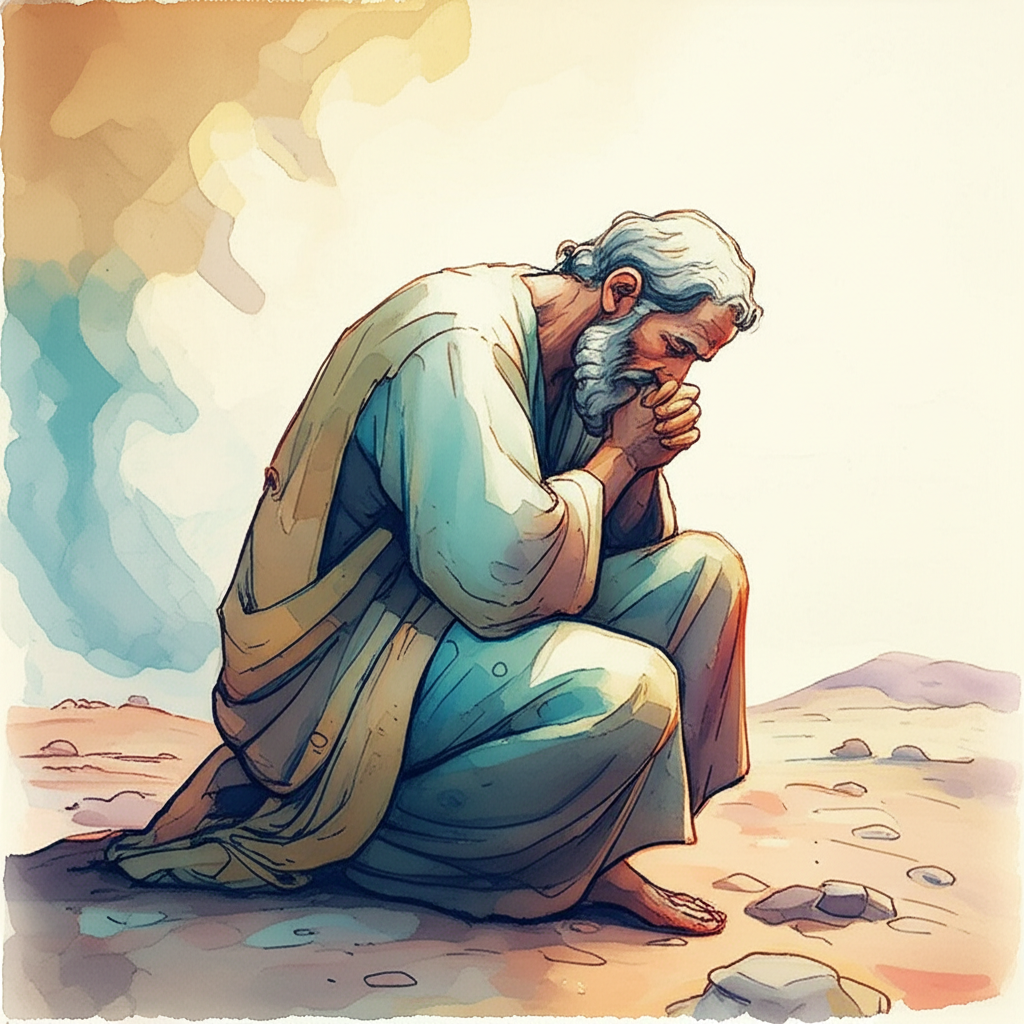
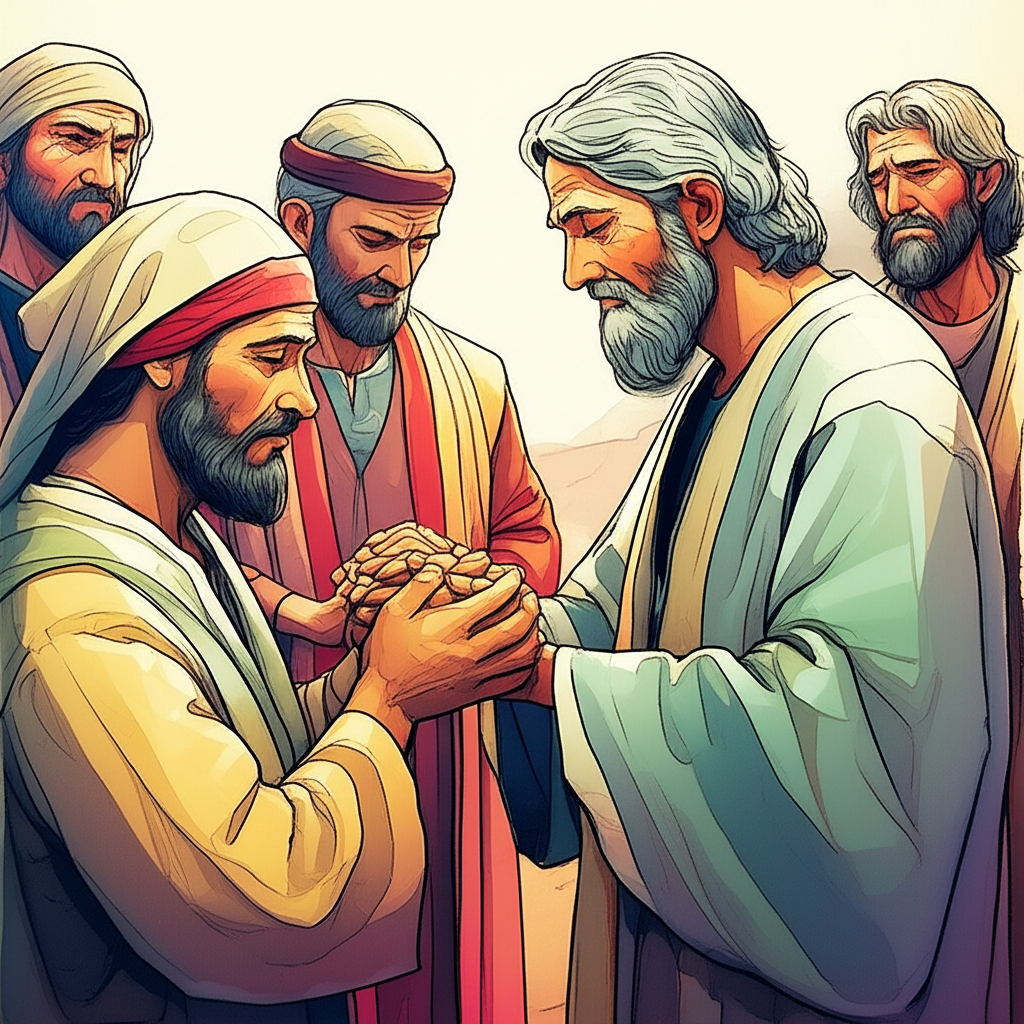
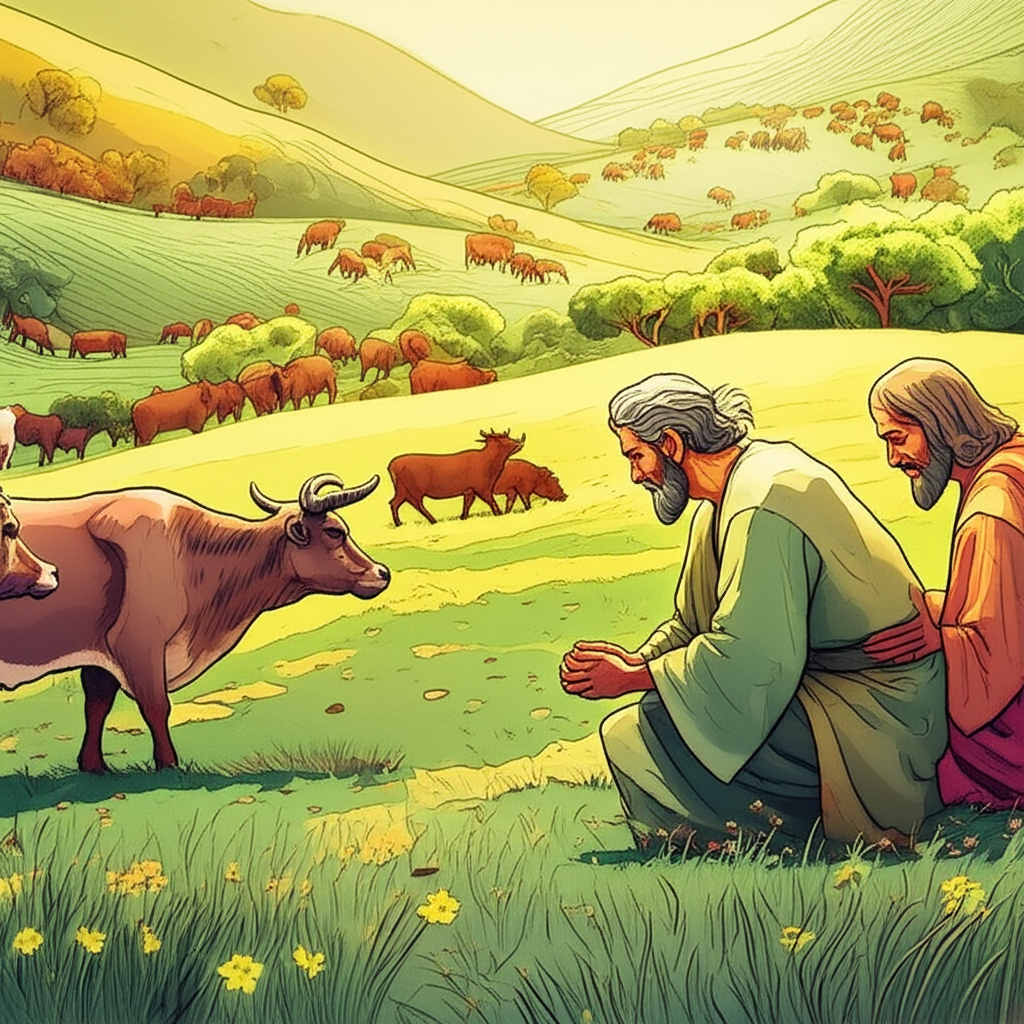
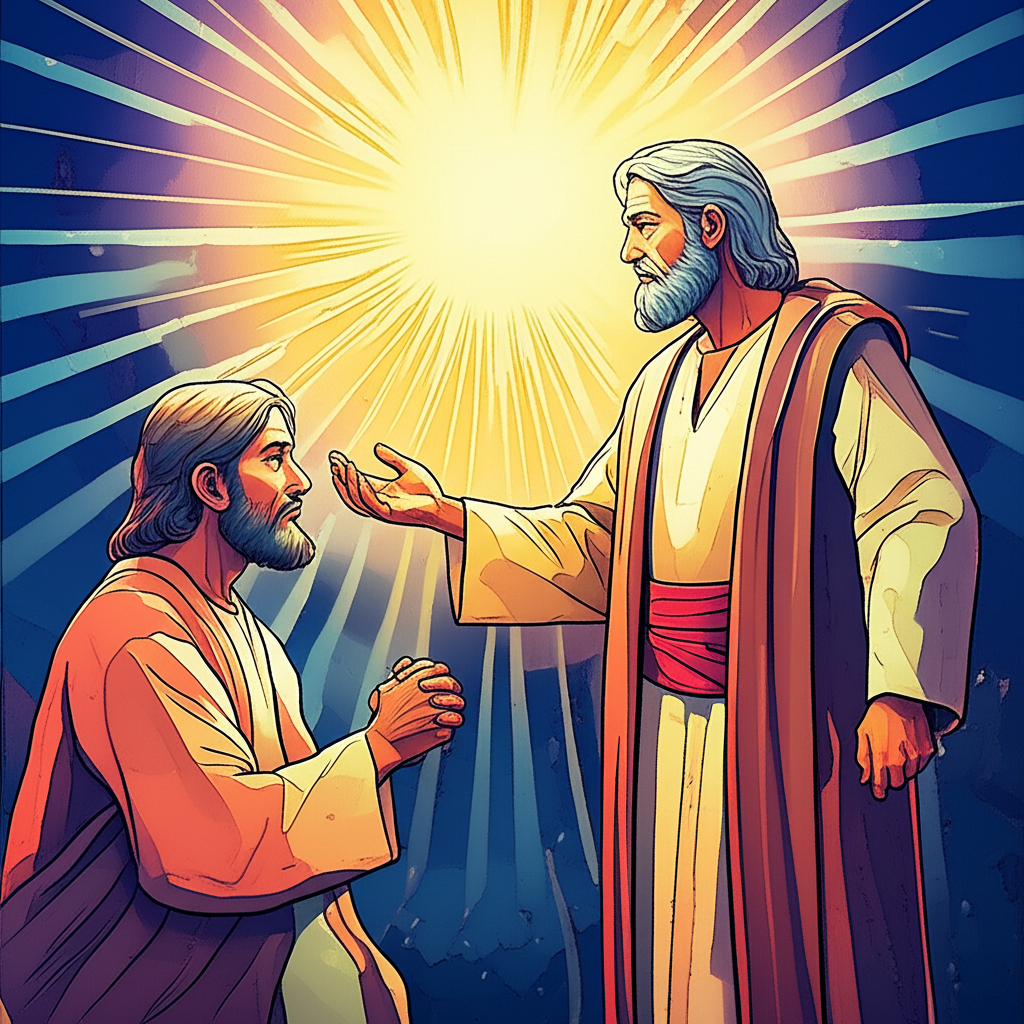
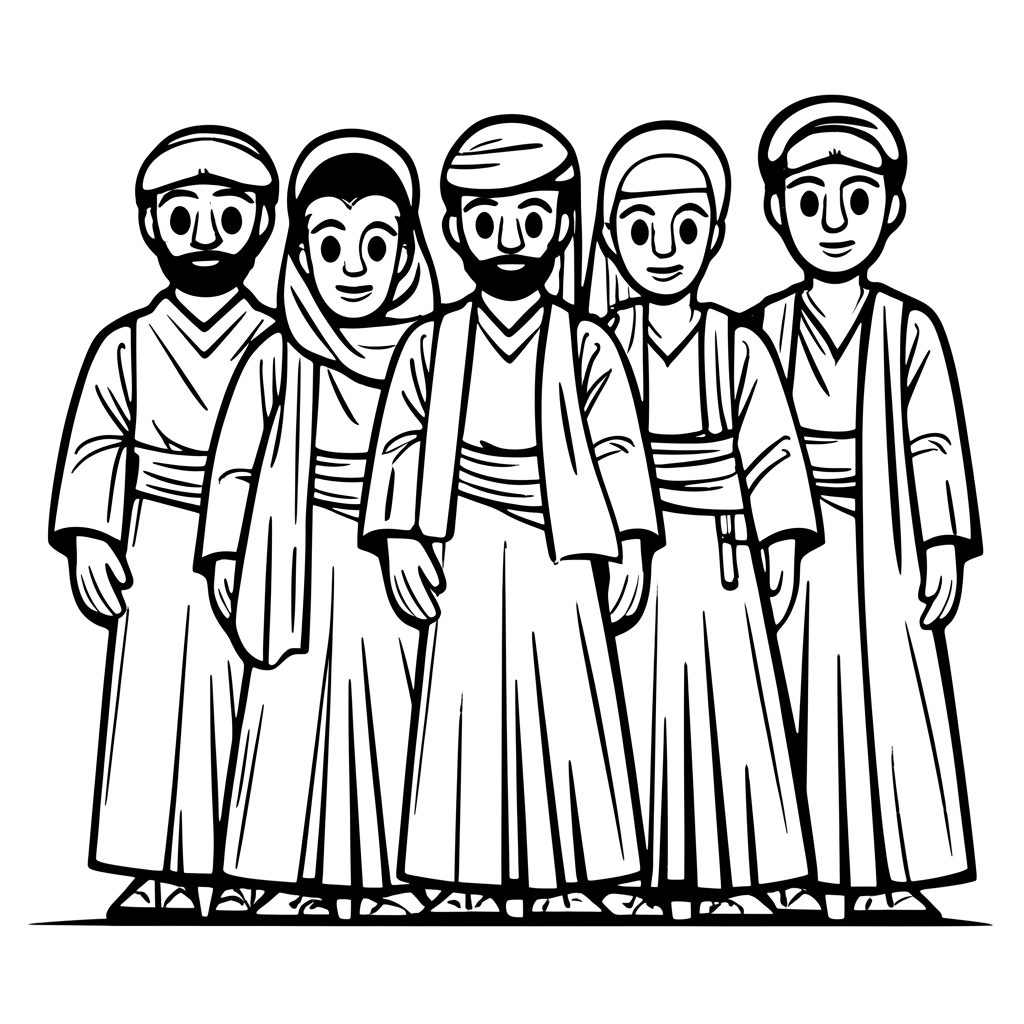
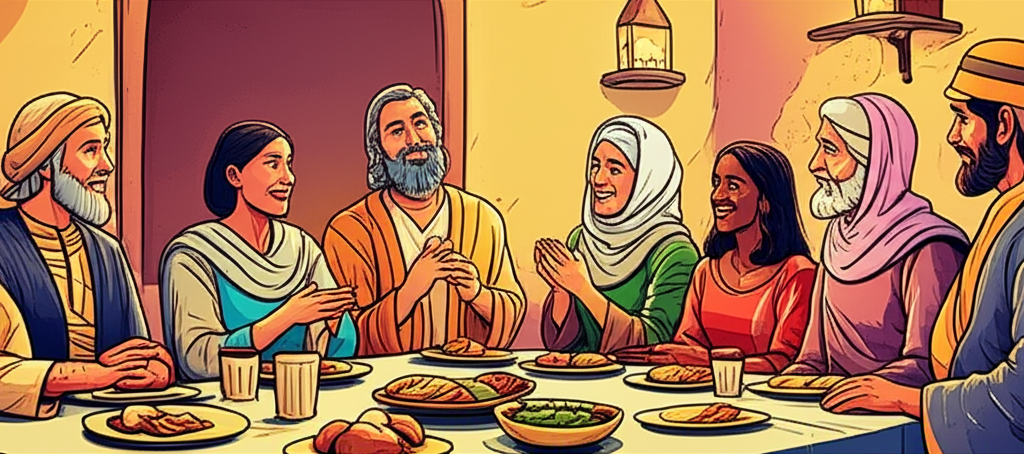



Job chapter 42 kjv
- 1 Then Job answered the LORD, and said,
- 2 I know that thou canst do every thing, and that no thought can be withholden from thee.
- 3 Who is he that hideth counsel without knowledge? therefore have I uttered that I understood not; things too wonderful for me, which I knew not.
- 4 Hear, I beseech thee, and I will speak: I will demand of thee, and declare thou unto me.
- 5 I have heard of thee by the hearing of the ear: but now mine eye seeth thee.
- 6 Wherefore I abhor myself, and repent in dust and ashes.
- 7 And it was so, that after the LORD had spoken these words unto Job, the LORD said to Eliphaz the Temanite, My wrath is kindled against thee, and against thy two friends: for ye have not spoken of me the thing that is right, as my servant Job hath.
- 8 Therefore take unto you now seven bullocks and seven rams, and go to my servant Job, and offer up for yourselves a burnt offering; and my servant Job shall pray for you: for him will I accept: lest I deal with you after your folly, in that ye have not spoken of me the thing which is right, like my servant Job.
- 9 So Eliphaz the Temanite and Bildad the Shuhite and Zophar the Naamathite went, and did according as the LORD commanded them: the LORD also accepted Job.
- 10 And the LORD turned the captivity of Job, when he prayed for his friends: also the LORD gave Job twice as much as he had before.
- 11 Then came there unto him all his brethren, and all his sisters, and all they that had been of his acquaintance before, and did eat bread with him in his house: and they bemoaned him, and comforted him over all the evil that the LORD had brought upon him: every man also gave him a piece of money, and every one an earring of gold.
- 12 So the LORD blessed the latter end of Job more than his beginning: for he had fourteen thousand sheep, and six thousand camels, and a thousand yoke of oxen, and a thousand she asses.
- 13 He had also seven sons and three daughters.
- 14 And he called the name of the first, Jemima; and the name of the second, Kezia; and the name of the third, Kerenhappuch.
- 15 And in all the land were no women found so fair as the daughters of Job: and their father gave them inheritance among their brethren.
- 16 After this lived Job an hundred and forty years, and saw his sons, and his sons' sons, even four generations.
- 17 So Job died, being old and full of days.
Job chapter 42 nkjv
- 1 Then Job answered the LORD and said:
- 2 "I know that You can do everything, And that no purpose of Yours can be withheld from You.
- 3 You asked, 'Who is this who hides counsel without knowledge?' Therefore I have uttered what I did not understand, Things too wonderful for me, which I did not know.
- 4 Listen, please, and let me speak; You said, 'I will question you, and you shall answer Me.'
- 5 "I have heard of You by the hearing of the ear, But now my eye sees You.
- 6 Therefore I abhor myself, And repent in dust and ashes."
- 7 And so it was, after the LORD had spoken these words to Job, that the LORD said to Eliphaz the Temanite, "My wrath is aroused against you and your two friends, for you have not spoken of Me what is right, as My servant Job has.
- 8 Now therefore, take for yourselves seven bulls and seven rams, go to My servant Job, and offer up for yourselves a burnt offering; and My servant Job shall pray for you. For I will accept him, lest I deal with you according to your folly; because you have not spoken of Me what is right, as My servant Job has."
- 9 So Eliphaz the Temanite and Bildad the Shuhite and Zophar the Naamathite went and did as the LORD commanded them; for the LORD had accepted Job.
- 10 And the LORD restored Job's losses when he prayed for his friends. Indeed the LORD gave Job twice as much as he had before.
- 11 Then all his brothers, all his sisters, and all those who had been his acquaintances before, came to him and ate food with him in his house; and they consoled him and comforted him for all the adversity that the LORD had brought upon him. Each one gave him a piece of silver and each a ring of gold.
- 12 Now the LORD blessed the latter days of Job more than his beginning; for he had fourteen thousand sheep, six thousand camels, one thousand yoke of oxen, and one thousand female donkeys.
- 13 He also had seven sons and three daughters.
- 14 And he called the name of the first Jemimah, the name of the second Keziah, and the name of the third Keren-Happuch.
- 15 In all the land were found no women so beautiful as the daughters of Job; and their father gave them an inheritance among their brothers.
- 16 After this Job lived one hundred and forty years, and saw his children and grandchildren for four generations.
- 17 So Job died, old and full of days.
Job chapter 42 niv
- 1 Then Job replied to the LORD:
- 2 "I know that you can do all things; no purpose of yours can be thwarted.
- 3 You asked, 'Who is this that obscures my plans without knowledge?' Surely I spoke of things I did not understand, things too wonderful for me to know.
- 4 "You said, 'Listen now, and I will speak; I will question you, and you shall answer me.'
- 5 My ears had heard of you but now my eyes have seen you.
- 6 Therefore I despise myself and repent in dust and ashes."
- 7 After the LORD had said these things to Job, he said to Eliphaz the Temanite, "I am angry with you and your two friends, because you have not spoken the truth about me, as my servant Job has.
- 8 So now take seven bulls and seven rams and go to my servant Job and sacrifice a burnt offering for yourselves. My servant Job will pray for you, and I will accept his prayer and not deal with you according to your folly. You have not spoken the truth about me, as my servant Job has."
- 9 So Eliphaz the Temanite, Bildad the Shuhite and Zophar the Naamathite did what the LORD told them; and the LORD accepted Job's prayer.
- 10 After Job had prayed for his friends, the LORD restored his fortunes and gave him twice as much as he had before.
- 11 All his brothers and sisters and everyone who had known him before came and ate with him in his house. They comforted and consoled him over all the trouble the LORD had brought on him, and each one gave him a piece of silver and a gold ring.
- 12 The LORD blessed the latter part of Job's life more than the former part. He had fourteen thousand sheep, six thousand camels, a thousand yoke of oxen and a thousand donkeys.
- 13 And he also had seven sons and three daughters.
- 14 The first daughter he named Jemimah, the second Keziah and the third Keren-Happuch.
- 15 Nowhere in all the land were there found women as beautiful as Job's daughters, and their father granted them an inheritance along with their brothers.
- 16 After this, Job lived a hundred and forty years; he saw his children and their children to the fourth generation.
- 17 And so Job died, an old man and full of years.
Job chapter 42 esv
- 1 Then Job answered the LORD and said:
- 2 "I know that you can do all things, and that no purpose of yours can be thwarted.
- 3 'Who is this that hides counsel without knowledge?' Therefore I have uttered what I did not understand, things too wonderful for me, which I did not know.
- 4 'Hear, and I will speak; I will question you, and you make it known to me.'
- 5 I had heard of you by the hearing of the ear, but now my eye sees you;
- 6 therefore I despise myself, and repent in dust and ashes."
- 7 After the LORD had spoken these words to Job, the LORD said to Eliphaz the Temanite: "My anger burns against you and against your two friends, for you have not spoken of me what is right, as my servant Job has.
- 8 Now therefore take seven bulls and seven rams and go to my servant Job and offer up a burnt offering for yourselves. And my servant Job shall pray for you, for I will accept his prayer not to deal with you according to your folly. For you have not spoken of me what is right, as my servant Job has."
- 9 So Eliphaz the Temanite and Bildad the Shuhite and Zophar the Naamathite went and did what the LORD had told them, and the LORD accepted Job's prayer.
- 10 And the LORD restored the fortunes of Job, when he had prayed for his friends. And the LORD gave Job twice as much as he had before.
- 11 Then came to him all his brothers and sisters and all who had known him before, and ate bread with him in his house. And they showed him sympathy and comforted him for all the evil that the LORD had brought upon him. And each of them gave him a piece of money and a ring of gold.
- 12 And the LORD blessed the latter days of Job more than his beginning. And he had 14,000 sheep, 6,000 camels, 1,000 yoke of oxen, and 1,000 female donkeys.
- 13 He had also seven sons and three daughters.
- 14 And he called the name of the first daughter Jemimah, and the name of the second Keziah, and the name of the third Keren-happuch.
- 15 And in all the land there were no women so beautiful as Job's daughters. And their father gave them an inheritance among their brothers.
- 16 And after this Job lived 140 years, and saw his sons, and his sons' sons, four generations.
- 17 And Job died, an old man, and full of days.
Job chapter 42 nlt
- 1 Then Job replied to the LORD:
- 2 "I know that you can do anything,
and no one can stop you. - 3 You asked, 'Who is this that questions my wisdom with such ignorance?'
It is I ? and I was talking about things I knew nothing about,
things far too wonderful for me. - 4 You said, 'Listen and I will speak!
I have some questions for you,
and you must answer them.' - 5 I had only heard about you before,
but now I have seen you with my own eyes. - 6 I take back everything I said,
and I sit in dust and ashes to show my repentance." - 7 After the LORD had finished speaking to Job, he said to Eliphaz the Temanite: "I am angry with you and your two friends, for you have not spoken accurately about me, as my servant Job has.
- 8 So take seven bulls and seven rams and go to my servant Job and offer a burnt offering for yourselves. My servant Job will pray for you, and I will accept his prayer on your behalf. I will not treat you as you deserve, for you have not spoken accurately about me, as my servant Job has."
- 9 So Eliphaz the Temanite, Bildad the Shuhite, and Zophar the Naamathite did as the LORD commanded them, and the LORD accepted Job's prayer.
- 10 When Job prayed for his friends, the LORD restored his fortunes. In fact, the LORD gave him twice as much as before!
- 11 Then all his brothers, sisters, and former friends came and feasted with him in his home. And they consoled him and comforted him because of all the trials the LORD had brought against him. And each of them brought him a gift of money and a gold ring.
- 12 So the LORD blessed Job in the second half of his life even more than in the beginning. For now he had 14,000 sheep, 6,000 camels, 1,000 teams of oxen, and 1,000 female donkeys.
- 13 He also gave Job seven more sons and three more daughters.
- 14 He named his first daughter Jemimah, the second Keziah, and the third Keren-happuch.
- 15 In all the land no women were as lovely as the daughters of Job. And their father put them into his will along with their brothers.
- 16 Job lived 140 years after that, living to see four generations of his children and grandchildren.
- 17 Then he died, an old man who had lived a long, full life.
- Bible Book of Job
- 1 Story of Job
- 2 Satan Attacks Job's Health
- 3 Job Laments His Birth
- 4 Eliphaz Speaks: The Innocent Prosper
- 5 Call now; is there anyone who will answer you? To which of the holy ones will
- 6 Job Replies: My Complaint Is Just
- 7 Job Continues: My Life Has No Hope
- 8 Bildad Speaks: Job Should Repent
- 9 Job Replies: There Is No Arbiter
- 10 Job Continues: A Plea to God
- 11 Zophar Speaks: You Deserve Worse
- 12 Job Replies: The Lord Has Done This
- 13 Job Continues: Still I Will Hope in God
- 14 Job Continues: Death Comes Soon to All
- 15 Eliphaz Accuses: Job Does Not Fear God
- 16 Job Replies: Miserable Comforters Are You
- 17 Job Continues: Where Then Is My Hope?
- 18 Bildad Speaks: God Punishes the Wicked
- 19 Job Replies: My Redeemer Lives
- 20 Zophar Speaks: The Wicked Will Suffer
- 21 Job Replies: The Wicked Do Prosper
- 22 Eliphaz Speaks: Job's Wickedness Is Great
- 23 Job Replies: Where Is God?
- 24 Why are not times of judgment kept by the Almighty, and why do those who know
- 25 Bildad Speaks: Man Cannot Be Righteous
- 26 Job Replies: God's Majesty Is Unsearchable
- 27 Job Continues: I Will Maintain My Integrity
- 28 Job Continues: Where Is Wisdom?
- 29 Job's Summary Defense
- 30 But now they laugh at me, men who are younger than I, whose fathers I would
- 31 Covenant with my Eyes
- 32 Elihu Rebukes Job's Three Friends
- 33 Elihu Rebukes Job
- 34 Elihu Asserts God's Justice
- 35 Elihu Condemns Job
- 36 Elihu Extols God's Greatness
- 37 Elihu Proclaims God's Majesty
- 38 Job questions God
- 39 Do you know when the mountain goats give birth? Do you observe the calving of
- 40 Job Promises Silence
- 41 Lord's challenge of Leviathan
- 42 Job's Repentance and Restoration